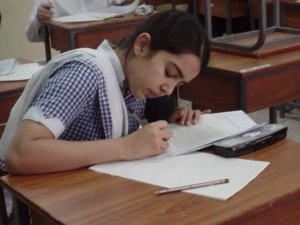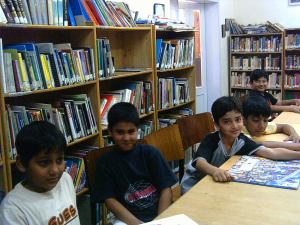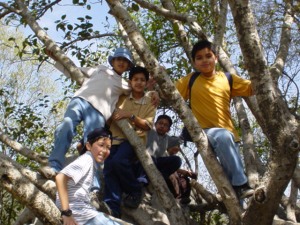Throughout education, from the first day to the last, there should be a sense of intellectual adventure … let the student be active rather than passive. This is one of the secrets of making education a happiness rather than a torment… Bertrand Russell On Education
We believe that the pupil’s natural desire to learn needs to be harnessed. It is not so much the amount of matter learnt as the spirit in which it is learnt – the spirit of adventure and liberty, the sense of setting out upon a voyage of discovery.
 At Khaldunia, pupils supplement the classroom learning experience by their own efforts, for which every opportunity is provided though a wide range of teaching methods. Group work, story telling and story writing, role play, demonstration, experimentation, questioning and experimentation all form part of the daily routine.
At Khaldunia, pupils supplement the classroom learning experience by their own efforts, for which every opportunity is provided though a wide range of teaching methods. Group work, story telling and story writing, role play, demonstration, experimentation, questioning and experimentation all form part of the daily routine.
The staff
Khaldunia’s policy is to hire the best and the brightest as teachers. All staff is experienced and regular workshops and training sessions are held as refresher courses. O Level teachers also regularly attend the University of Cambridge examiners’ courses held annually. Our elementary staff undergo a rigorous summer school training programme conducted by the elementary coordinators.
Laboratory
We strongly believe in the importance of hands-on experience to promote scientific enquiry and understanding. The School has set up a well equipped laboratory designed specifically to cater to the demands of the middle and secondary school science curriculum. In the new campus it is planned to have several laboratories catering to different age groups and the various sciences.
Students are exposed to the lab on a regular basis: they are encouraged to use specific equipment designed to allow them to become adept at handling instruments and become familiar with a variety of tools for measuring, weighing, observing, recording and understanding the concept of empirical testing.
Library

library
The school library has a large variety of reading and resource material. We subscribe to suitable publications and continue to build up both our reading and audio-visual resources.
Our resource section for teachers is rapidly expanding with new books being imported from abroad to facilitate teachers in the classroom. The library is eventually intended to become a teachers’ resource centre open to all members.
Students are urged to use the library regularly to develop the habit of reading and to teach them the basics of research – including the use of an index, encyclopaedias, an atlas and a dictionary and thesaurus and the Internet. Students prepare projects for presentation based on an annual school theme. One such theme was entitled community development in which the younger students explored the community life of insects while the older ones visited the katchi abadis and the senior most students researched successful community development projects such as the AKRSP and the Orangi Pilot Project.
Computer laboratory
The computer laboratory was set up in August 2000. E-mail and Internet facilities are available for students and staff thus ensuring access to information technology. All students of the middle and senior schools are allocated regular computing classes while the youngest ones are familiarised with the concept of the computer as a tool for learning. While we have several educational software packages, the emphasis is on learning to use the PC to as a word processor and number cruncher and in the preparation of PowerPoint presentations. Khaldunia has its own website – http://www.khaldunia.edu.pk.
Extended curriculum: beyond the classroom
The school week embodies a full academic and non academic curriculum.
The Student Council has set up a number of societies. Essentially run by the students themselves with staff guidance, the Council produces an annual magazine, holds debates, drama presentations, declamation contests, quizzes, poetry recitals, spelling bees, flower arrangement and food preparation competitions etc on a term wise basis.
Bringing the world to Khaldunia
Twice weekly assemblies are conducted by different classes on a rota basis to present news, class projects, skits, and to raise issues of importance for general discussion. We do not believe that school going children are too young to be exposed to the stirring issues of the day – thus our children are encouraged to question and debate a whole range of issues – be it the policies of the United States in Iraq and Palestine, or the urgent need to conserve water, or indeed the wisdom of nuclear proliferation. Indeed, some might quibble about how critically the students are taught to think and question!
To disseminate a wider range of opinion for debate and discussion, guest lecturers are invited to speak to the students who are encouraged to develop informed views about issues of national and international importance. Thus, students have had a first hand account of a survivor of the Hiroshima holocaust, participated in the International Women’s Day march, held a rally against the war in Iraq, protested the destruction of the Bamiyan Buddhas, etc.
Some prominent guest lecturers included eminent scholars such as the late Dr. Eqbal Ahmad, Dr. Pervez Hoodbhoy, Dr. Zia Mian, Dr. A.H. Nayyar, Dr. Tariq Rahman, the international journalist and writer Laurence Lifschultz, economists such as Dr Shahrukh Rafi Khan, Dr Pervez Tahir, and the late Mr. Omar Asghar Khan, scientists such as Arvind Gupta, representatives of the Foreign Office such as Zamir Akram, journalists such as Zafar Abbas and so on.
The School also holds seminars and workshops for students and staff and the general public: Khaldunia and Oxfam jointly sponsored a seminar on education.
Annual Events
An Art and Craft Fair and a Science fair are held yearly to nurture the creative streak. Students from every class – 1 to 3 – are required to prepare a display of the work done during the course of the year and explain to visitors the scientific concepts they embody. Older students prepare projects, working models and charts to illustrate a particular concept – the range is wide. For instance one year the 1st graders explained how ‘floaters’ can be changed to ‘sinkers’ and vice versa while 4th graders made a solar oven and proudly presented their hot chips to taste, 6th graders prepared a working model of wind energy harnessed to create electrical energy and 9th graders had a hovercraft ‘hovering’ over a tub of water. Again, the aim is to encourage students to think beyond the textbook. Sports hold a special place in every pupil’s heart and are often the keystone to winning the annual House trophy. Cricket and football matches, both within and outside the school contribute to the lively atmosphere in the school.
Caring and sharing
Many traditions at Khaldunia have grown over the years. The annual hike in the Margallas is eagerly awaited as is the Bonfire night where the Houses compete to display their talent in a range of media – in recent years, we have had skits written by students, a video Mockumentary, singing and guitar playing etc.
 But students are not only out to have fun – the spirit of service is highly encouraged. A funfair to raise funds for charity and raise awareness of the plight of the underprivileged is held annually. In the past, Khaldunia has donated funds raised from these events to the Al Shifa Eye Trust Hospital, the Edhi Foundation and the SOS villages, the Shaukat Khanum Trust, the Marie Adelaide Leprosy Centre and the Sindh Institute of Urology etc. etc.
But students are not only out to have fun – the spirit of service is highly encouraged. A funfair to raise funds for charity and raise awareness of the plight of the underprivileged is held annually. In the past, Khaldunia has donated funds raised from these events to the Al Shifa Eye Trust Hospital, the Edhi Foundation and the SOS villages, the Shaukat Khanum Trust, the Marie Adelaide Leprosy Centre and the Sindh Institute of Urology etc. etc.
In the same spirit, Khaldunia’s students raised funds for the earthquake victims of 8/10 and volunteered at hospitals and tent villages to aid the wounded. In fact, they set up a foundation in the memory of one of our students who died in the catastrophe.
Outreach
Khaldunia has since its inception fostered contact with like minded groups nationally and internationally – we joined hands with Rozan, an NGO dedicated to improving the emotional health of the youth and women, to hold regular discussions and special one-to-one sessions with children who need emotional support. Other NGO’s we have worked with include ActionAid, Sachet, SPARC, Network, WAF, WWF etc and involved students in art projects, quizzes, speeches etc. all aimed at promoting healthy living, creating better traditions and helping spread awareness of issues. We have also worked with the traffic police in Islamabad, human and animal rights activists as well as environmental groups. Internationally, Khaldunia’s students participated in a series of video-conferences with students in the United States through America Abroad Media to help discuss the important international issues of the day and help disseminate a Pakistani point of view. Such exchanges not only sharpened students’ own knowledge but also taught them to express their own and listen to others’ points of view.
Another bridge was created between Khaldunia and the University of Canterbury in New Zealand – a series of workshops on conflict resolution between children using the technique of peer mediation.
Outside the School: field trips
Field trips are arranged regularly – apart from the usual Safari park, wildlife park etc., students have visited the SUNGI schools in Hazara and the NWFP, the Khewra Salt Mines, Takhtbai to see the Buddhist ruins, Sialkot to visit the industrial units there, Taxila to visit the ruins and the Heavy Mechanical Complex, Kamra Air Base, and Mangla and Tarbela Dams among a host of others. In conjunction with the Adventure Foundation, overnight trips have involved both the upper elementary and middle schools in camping trips in the environs of Islamabad and further north. The senior school students have undertaken more adventurous tours – Gilgit and the Hunza Valley, Skardu and the Satpara Lake, the Kaghan Valley, a camping trip to the Deosai National Park with the Himalayan Wildlife Project. A notable trip abroad in 2001 took students to India to visit schools and promote peace and friendship with the young people there.
We gratefully acknowledge the help of parents and friends who have made these possible. In fact, participation and support from the School parent body is highly appreciated and encouraged.
The subjects which were dearest to examiners were almost invariably those I fancied least… I should have liked to say what I knew, they always tried to ask about what I did not know… When I would have willingly displayed my knowledge, they sought to expose my ignorance… Sir Winston Churchill
Students, parents and teachers all need to know how well the child is learning. Exams, standardised tests and graded assessments are the orthodox means of evaluating children’s progress. However, in addition to these traditional methods of measuring progress, the School has adopted a holistic approach to student evaluation.
At Khaldunia continuous assessment is employed to monitor the student’s progress through the system. Such a technique involves the use of a whole range of assessment procedures.
A system of personal projects is used to help assess the understanding of interactive themes – an essay, a poem, a drama script, a booklet – all may be used to help project the student’s interest. Students are expected to not merely write but also present their ideas to the class or the school.
Progress reports
Monthly test marks are sent home but we believe mere statistics are inadequate. Thus, on a term wise basis, educational achievements are recorded and shared with parents. Information on social development, work habits and extra curricular achievements are also reported so that parents are kept abreast of their children’s progress through regular parent teacher conferences and individual visits when necessary.
Promotion to the next class is based on continuous assessment as well as final end-of-year examinations from the 4th grade upwards. As we believe that positive reinforcement of one’s self image is an important aspect of emotional growth, the School’s policy is not one of seeking out the negative in the child – a student who demonstrates the willingness to learn may be granted promotion even if he has not strictly met the requirements. However, two consecutive failures to obtain promotion will necessitate withdrawal of the child. The Head’s decision in this matter will be final.
Public examinations
Khaldunia is linked to the University of Cambridge International Examinations system. Since 1999, when our first O level batch appeared, successive years have seen some excellent results in this international exam. Students have obtained up to 12 straight A’s, with many students being awarded the University’s High Achievement Award for different subjects. Overall too, our students have obtained 93 % A’s and B’s – with more than 50% of that figure being A’s!
After Khaldunia…?
Many of our students have gained admission to prestigious universities within the country and abroad: our students are currently at University College, London, Royal Holloway and the University of Hull in the UK, the University of New South Wales, Australia, Hampshire College, Hamilton College, Dartmouth, the University of Maryland and the University of Chicago in the US and at LUMS and GIK in Pakistan. In 2005, one of our first batch completed an MPhil. from Cambridge (UK) while from the second batch, a student has begun reading for a PhD at the University of Illinois. Other students have completed Masters programmes from different universities abroad including Cornell and Harvard. We can even report of burgeoning families as some of our old students embark into marriage and parenthood! The Student Council has inaugurated an alumni association and we welcome feedback from our erstwhile students.
Annual Convocation
The School recognizes the achievements of students in various fields of endeavour by awarding certificates of merit and prizes for outstanding academic and extra curricular achievements. At the annual convocation ceremony, students of the outgoing class are awarded their certificates while a special medal is reserved for the student to obtain the best academic result.
The Eqbal Ahmad Memorial Medal is awarded to the Student of the Year – the student who has distinguished her or himself for academic and extra curricular achievements. The Omar Asghar Khan Memorial Medal is awarded to the student who has made most notable progress over the years.
True to form, we let no occasion slip where we might bring the outside world to our students. At the Convocation, we invite not so-called VIP’s but intellectuals, poets, scholars and people who have distinguished themselves in the field of letters to deliver the keynote address. Our speakers in the past have included the ex-Principal of Gordon College, Professor Khwaja Masood, the late Mr. Omar Asghar Khan, Ms. Kishwar Naheed, Mrs. Rabea Raffeuzzaman, Mr. I.A. Rahman, Mr. Shoaib Hashmi , Ms Nasreen Azhar, Mr. Iftikhar Arif, Dr, Pervez Hoodbhoy and Dr. Shaukat Hameed Khan.